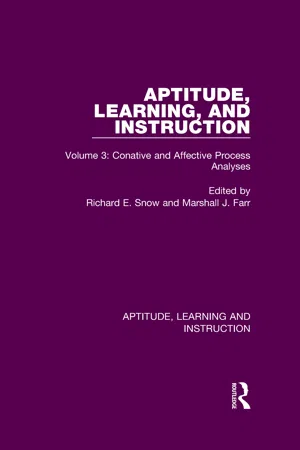
Aptitude, Learning, and Instruction
Volume 3: Conative and Affective Process Analyses
Richard E. Snow, Marshall J. Farr, Richard E. Snow, Marshall J. Farr
- 384 pagine
- English
- ePUB (disponibile sull'app)
- Disponibile su iOS e Android
Aptitude, Learning, and Instruction
Volume 3: Conative and Affective Process Analyses
Richard E. Snow, Marshall J. Farr, Richard E. Snow, Marshall J. Farr
Informazioni sul libro
Originally published in 1987, this book reports the proceedings of a conference held in 1983 at Stanford, California. The purpose of the conference was to bring together individuals whose research reflected advanced theoretical thinking and empirical evidence on the combined analysis of cognitive, conative, and affective processes, the role of these processes in learning from instruction, and the importance of individual differences therein. The Editors believed that this volume made an early and important contribution to the reemphasis and reexamination of the conative and affective aspects of human performance, in coordination with cognitive psychology, in the study of aptitude, learning, and instruction. It takes its place as Volume 3 of the Aptitude, Learning, and Instruction series.
Domande frequenti
Informazioni
1
Cognitive-Conative-Affective Processes in Aptitude, Learning, and Instruction An Introduction
Conference Background
Research Background
Historically, three modes of mental functioning...
Indice dei contenuti
- Cover
- Half Title
- Title Page
- Copyright Page
- Original Title Page
- Original Copyright Page
- Table of Contents
- Dedication
- Preface
- 1. Cognitive-Conative-Affective Processes in Aptitude, Learning, and Instruction: An Introduction
- 2. Aptitude Complexes
- 3. Structural Relationships Across Cognition, Personality, and Style
- 4. Intelligence and Cognitive Style
- 5. Cerebral, Cognitive, and Conative Processes
- 6. Test Anxiety, Cognitive Interference, and Performance
- 7. The Influence of Positive Affect on Cognitive Organization: Implications for Education
- 8. Thinking about Feelings: The Development and Organization of Emotional Knowledge
- 9. Some Educational Implications of Sympathy and Anger from an Attributional Perspective
- 10. Making Learning Fun: A Taxonomy of Intrinsic Motivations for Learning
- 11. Intrinsic Motivation and Instructional Effectiveness in Computer-Based Education
- 12. Interestingness of Children’s Reading Material
- 13. If You Don’t Know It Work On it: Knowledge, Self-Regulation and Instruction
- 14. Discussion
- 15. Discussion
- 16. Discussion
- 17. Cognition, Affect and Motivation: Issues, Perspectives and Directions Toward Unity
- Author Index
- Subject Index